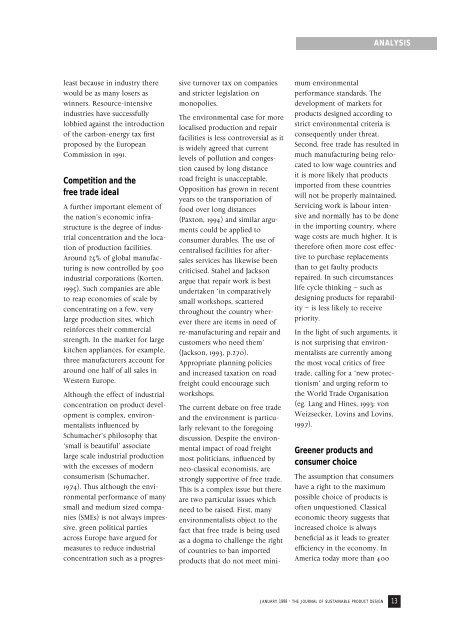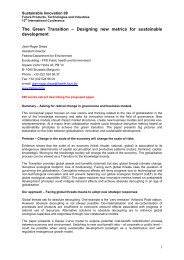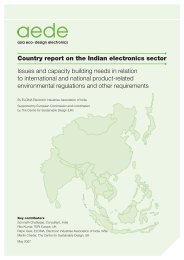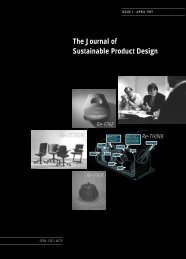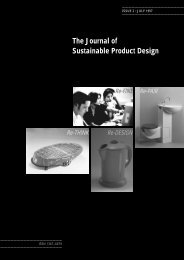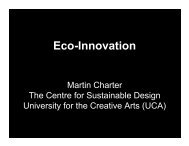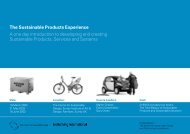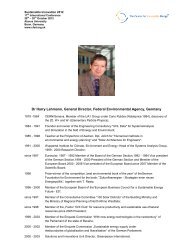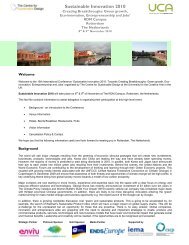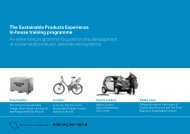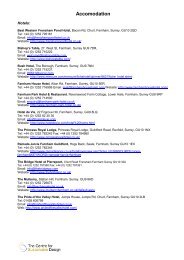acrobat JSPD 8 - The Centre for Sustainable Design
acrobat JSPD 8 - The Centre for Sustainable Design
acrobat JSPD 8 - The Centre for Sustainable Design
Create successful ePaper yourself
Turn your PDF publications into a flip-book with our unique Google optimized e-Paper software.
least because in industry there<br />
would be as many losers as<br />
winners. Resource-intensive<br />
industries have successfully<br />
lobbied against the introduction<br />
of the carbon-energy tax first<br />
proposed by the European<br />
Commission in 1991.<br />
Competition and the<br />
free trade ideal<br />
A further important element of<br />
the nation’s economic infrastructure<br />
is the degree of industrial<br />
concentration and the location<br />
of production facilities.<br />
Around 25% of global manufacturing<br />
is now controlled by 500<br />
industrial corporations (Korten,<br />
1995). Such companies are able<br />
to reap economies of scale by<br />
concentrating on a few, very<br />
large production sites, which<br />
rein<strong>for</strong>ces their commercial<br />
strength. In the market <strong>for</strong> large<br />
kitchen appliances, <strong>for</strong> example,<br />
three manufacturers account <strong>for</strong><br />
around one half of all sales in<br />
Western Europe.<br />
Although the effect of industrial<br />
concentration on product development<br />
is complex, environmentalists<br />
influenced by<br />
Schumacher’s philosophy that<br />
‘small is beautiful’ associate<br />
large scale industrial production<br />
with the excesses of modern<br />
consumerism (Schumacher,<br />
1974). Thus although the environmental<br />
per<strong>for</strong>mance of many<br />
small and medium sized companies<br />
(SMEs) is not always impressive,<br />
green political parties<br />
across Europe have argued <strong>for</strong><br />
measures to reduce industrial<br />
concentration such as a progres-<br />
sive turnover tax on companies<br />
and stricter legislation on<br />
monopolies.<br />
<strong>The</strong> environmental case <strong>for</strong> more<br />
localised production and repair<br />
facilities is less controversial as it<br />
is widely agreed that current<br />
levels of pollution and congestion<br />
caused by long distance<br />
road freight is unacceptable.<br />
Opposition has grown in recent<br />
years to the transportation of<br />
food over long distances<br />
(Paxton, 1994) and similar arguments<br />
could be applied to<br />
consumer durables. <strong>The</strong> use of<br />
centralised facilities <strong>for</strong> aftersales<br />
services has likewise been<br />
criticised. Stahel and Jackson<br />
argue that repair work is best<br />
undertaken ‘in comparatively<br />
small workshops, scattered<br />
throughout the country wherever<br />
there are items in need of<br />
re-manufacturing and repair and<br />
customers who need them’<br />
(Jackson, 1993, p.270).<br />
Appropriate planning policies<br />
and increased taxation on road<br />
freight could encourage such<br />
workshops.<br />
<strong>The</strong> current debate on free trade<br />
and the environment is particularly<br />
relevant to the <strong>for</strong>egoing<br />
discussion. Despite the environmental<br />
impact of road freight<br />
most politicians, influenced by<br />
neo-classical economists, are<br />
strongly supportive of free trade.<br />
This is a complex issue but there<br />
are two particular issues which<br />
need to be raised. First, many<br />
environmentalists object to the<br />
fact that free trade is being used<br />
as a dogma to challenge the right<br />
of countries to ban imported<br />
products that do not meet mini-<br />
JANUARY 1999 · THE JOURNAL OF SUSTAINABLE PRODUCT DESIGN<br />
ANALYSIS<br />
mum environmental<br />
per<strong>for</strong>mance standards. <strong>The</strong><br />
development of markets <strong>for</strong><br />
products designed according to<br />
strict environmental criteria is<br />
consequently under threat.<br />
Second, free trade has resulted in<br />
much manufacturing being relocated<br />
to low wage countries and<br />
it is more likely that products<br />
imported from these countries<br />
will not be properly maintained.<br />
Servicing work is labour intensive<br />
and normally has to be done<br />
in the importing country, where<br />
wage costs are much higher. It is<br />
there<strong>for</strong>e often more cost effective<br />
to purchase replacements<br />
than to get faulty products<br />
repaired. In such circumstances<br />
life cycle thinking – such as<br />
designing products <strong>for</strong> reparability<br />
– is less likely to receive<br />
priority.<br />
In the light of such arguments, it<br />
is not surprising that environmentalists<br />
are currently among<br />
the most vocal critics of free<br />
trade, calling <strong>for</strong> a ‘new protectionism’<br />
and urging re<strong>for</strong>m to<br />
the World Trade Organisation<br />
(eg. Lang and Hines, 1993; von<br />
Weizsecker, Lovins and Lovins,<br />
1997).<br />
Greener products and<br />
consumer choice<br />
<strong>The</strong> assumption that consumers<br />
have a right to the maximum<br />
possible choice of products is<br />
often unquestioned. Classical<br />
economic theory suggests that<br />
increased choice is always<br />
beneficial as it leads to greater<br />
efficiency in the economy. In<br />
America today more than 400<br />
13


